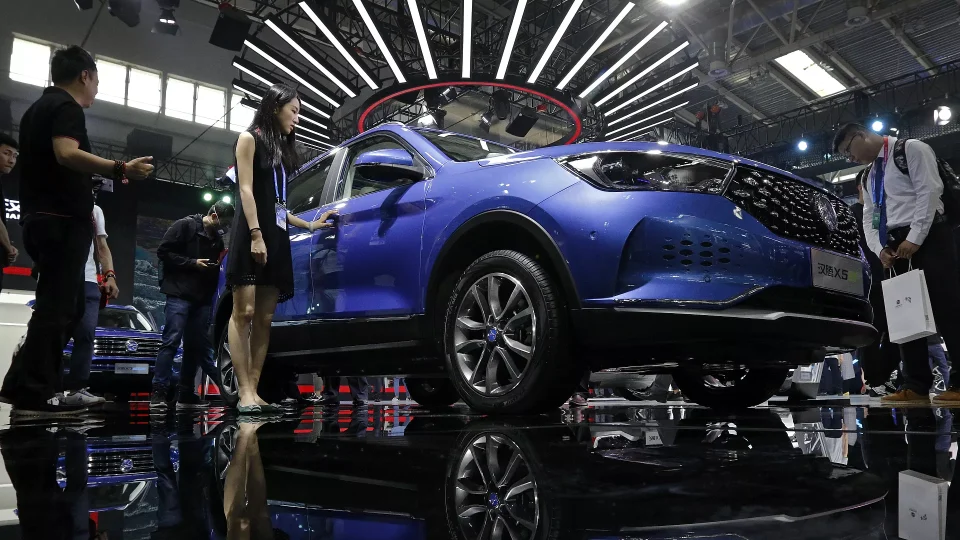Officials from both sides finally agree to hold consultations, signalling progress could be made on finding a way to end the subsidy spat.
China and the EU have agreed to hold talks over proposed tariffs that will target Chinese-made electric vehicles on the European market.
The announcement came after a call on Saturday between EU Commissioner Valdis Dombrovskis and Chinese Commerce Minister Wang Wentao.
“This is new and surprising in that it has not been possible to enter into a concrete negotiation timetable in the last few weeks,” said Germany’s vice-chancellor and Minister for Economic Affairs and Climate Action, Robert Habeck.
At the time of the breakthrough, Habeck was on a three-day diplomatic visit to China.
“We are far from the end but, at least, it is a first step that was not possible before,” he added.
On June 22, Minister of Commerce Wang Wentao met with German Vice Chancellor and Federal Minister for Economic Affairs and Climate Action Robert Habeck. The two sides exchanged views on China-Germany and China-EU economic and trade relations.https://t.co/6Voi1RDsZY pic.twitter.com/wvyFanEgON
— 中华人民共和国商务部MOFCOM (@MOFCOM_China) June 22, 2024
Habeck is the first senior European official to make a trip to China since Brussels decided to impose tariffs on Chinese EVs that could reach 48% of the total value of the goods.
The measure was announced this month as the result of a probe launched last year by the European Commission.
The investigation sought to determine whether European competitors were being harmed by Chinese subsidies which allowed manufacturers to keep their costs artificially low.
China has rejected the claims, arguing that its industry has flourished naturally.
Chinese growth “is the result of competition, rather than subsidies, let alone unfair competition,” said Zheng Shanjie, chairman of China’s National Development and Reform Commission, during a meeting with Germany’s Habeck.
Tariffs on EVs will be applicable from 4 July although definitive duties will be fixed in November. These typically last for five years.
Other forms of Chinese green tech, such as solar panels and wind turbines, have also been targeted by the Commission.
During a climate and transformation dialogue over the weekend, Habeck said “these are not punitive tariffs,” but rather that they were corrective measures intended to level out the trading playing field.
Compared with other European players, Germany has proven to be more reluctant to impose protectionist policies vis-à-vis China.
One reason for this is that Germany’s car manufacturing industry is heavily reliant on the Chinese market.
“We want to sell our cars in Europe, in North America, in Japan, in China, in Africa, in South America, in all the places,” said Chancellor Olaf Scholz last year. “But this means that we’re open to getting the cars of other countries also on the market of Germany.”
Following the Commission’s inquiry, China has already threatened to impose a number of tariffs on imported EU goods, including pork belly and cognac.
Fearful of measures that could affect the automobile sector, Europe’s Stellantis, which owns brands including Citroën, Peugeot, Vauxhall, Fiat, has also criticised tariffs that “contribute to the world fragmentation [of trade]”.
Europe’s propositions are still, however, more moderate than the approach taken by US President Joe Biden, who last month imposed a tariff of 100% on Chinese EV imports.
China is now urging Europe to double down on its planned duties, threatening to file a lawsuit with the World Trade Organisation if its appeals are not heeded.
In a Facebook post published on Saturday, China’s Ministry of Commerce said “inappropriate practices” were observed during the EU’s anti-dumping probe.
It added: “The recently released pre-disclosure proposes disproportionately high tariffs aimed at suppressing the development of Chinese enterprises. It is a typical protectionist measure, and China has made clear its strong dissatisfaction and firm opposition to this.”
During a press briefing on Monday, European Commission Spokesperson Johanna Bernsel confirmed that “there would be technical talks in Brussels this week” regarding tariffs on Chinese goods.
She reiterated that “any negotiated outcome of the investigation must be effective in addressing the injurious subsidisation [of imported products]”.



